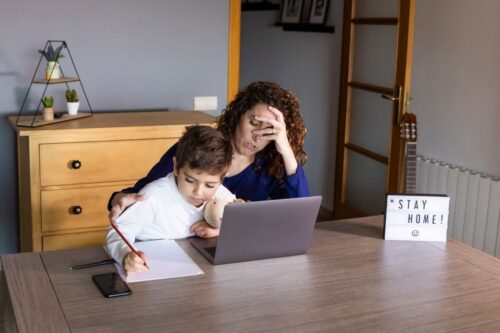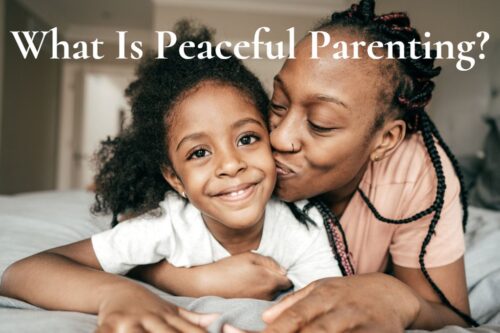Getting Children to Play Alone
Getting your children to play by themselves may seem impossible. Imagine your kids are playing for hours every day, without fighting or nagging, and you have time to work, cook, and rest. You don’t think it can be done? How do I have time to sit and work on articles when I am home with my kids all day, without another adult here to supervise them? Well, my kids play together for many hours daily. As I am writing this at my kitchen table, they are outside, on the deck, creating their world of dragons and roller coasters. And this has been my life for years now. It can be yours too.
Table of Contents
My Child Won’t Play Alone!
You probably have lots of work to do these days. And your kids are constantly pulling on your pant leg, or fighting, complaining and whining. They want you to play with them, they can’t seem to remain focused on their play for longer than 10 minutes, and you have to organize or direct their play constantly. Or they ask to be on their screens countless times a day.
I am telling you things can be a lot different. You can get your children to play alone or together for long stretches of time, without your intervention.
So, if getting your children to play independently always seemed like an impossible task, I am here to offer you hope.
Don’t Feel Guilty About Wanting Your Kids to Play Alone
Play is an activity that benefits both parents and children.
We need time away from each other. If we allow each other to have alone time, to recoup, then we can better appreciate the time we spend together.
As parents, we get some time to focus on ourselves or our adult “stuff”.
And children do important development while playing.
Also, play has been recognized as a human right of every child by the United Nations High Commission on Human Rights (scroll down to Article 31). However, nowadays children play far less than even a few decades ago. Their schedules are highly structured and it almost seems like we are afraid to let children “waste” too much time playing.
Yet there are so many benefits to play and children gain so much from it, that play should be mandatory in the same way that formal education is regulated by laws.
What Are the Benefits of Play?
Getting children to play benefits them on many levels. They learn about themselves and their environment. Here are a few of the benefits of play:
Physical
- Build active, healthy bodies
- Risk-taking
- Develop dexterity, fine and gross motor skills
- Healthy brain development
- Develop new competencies and skills
- Test their own limits
Cognitive/Intellectual
- Test new ideas
- Learn about consequences
- Problem-solving
- Develop imagination
- Language development
- Discover what interests them
Social/Communication
- Learn how to work in groups
- Share
- Negotiate
- Resolve conflicts
- Self-advocacy skills
- Leadership
- Moral capacities
Emotional/Mental
- Natural stress reliever
- Work through anxiety and fears
- Process their emotions
- Develop self-control
- Confidence
- Resiliency
What Kinds of Play Should Children Be Doing?
There are many kinds of play that children can engage in. And all are important for their development.
Children need to move their bodies, pretend and try on different roles, build and construct, challenge themselves to develop skills, explore the world, and create.
Ideally, children should have time to play individually, with siblings and friends, or sometimes an adult, and there should also be some time when the whole family engages in play together.
To get ideas for toys and games that promote these types of play, take a look at our Toys and Games That Promote Play page. It has 12 different categories of play with lots of toys and games. The great majority of these toys are ones that we currently own or have owned. I picked the ones that my kids loved and played with the most. Some of these toys we’ve had for years and my kids still get a lot of play out of them.
Getting Children to Play Alone
1. Create a Space
Create a special area in the home, that is designated for play. It doesn’t have to be an entire room, it can be just a corner that is inviting and accessible to the child. In this way, play receives the attention and importance that it deserves. Play is as important as sleeping or eating, for which we have created a space in our homes. I’ve always told my children that play is their work, their job. So in our family, we all treat it with respect and importance.
2. Dedicate Time to Play
Make sure you create time in the day that isn’t structured or adult-led. A good chunk of time should be dedicated to free play.
3. Respect Play
When you see your child immersed in play, do not interrupt. There is no need to go in and comment on what your child is doing, or to help, correct, or enhance the experience in any way. Your child is doing important childhood work and is challenging herself at precisely the right level for the best learning to happen.
4. Connect First
When children go off to play and they become fully immersed in it, they perceive it as a sort of separation. For them to feel comfortable leaving our presence to be on their own to play, make sure you spend enough time connecting with them. Try snuggles in the morning, being fully present during breakfast, or doing Special Time with them.
5. Keep It Fresh
Kids love new toys anytime. But you don’t have to go out and buy new toys every week. You can just pack them up in bins and put them away for a while. When they seem to need a change, bring some of the old toys out. My kids are always excited to rediscover some of their old toys.
6. Gradual Release of Responsibility
This is a strategy that I used a lot in my teaching days. It basically means you are starting your child on an activity, then slowly allowing them more and more control over the activity, as they become more proficient.
If your children are used to you being very involved in their play, initially they may have trouble playing on their own. You will have to do a gradual release of responsibility.
That means that you will start playing with them and plan on withdrawing from the play after a while. You can just say, “I will sit here next to you and work while you continue playing.” Every day, you can spend less and less time playing with your children, until they are ready to spend more and more time on their own, doing what is their childhood work.
Eventually, your child will not need you to orchestrate their play all day long.
Final Words of Encouragement
Even my daughter, who is an extrovert and loves human interaction, and who seemed to never want to play by herself, has learned to enjoy her own company or her brother’s. She now plays for hours every day without me.
While getting children used to playing by themselves takes a bit of work and time, I encourage you to not give up. It is very possible and desirable for children to learn to be by themselves, in their own company. They have lots to gain from it.







